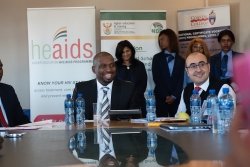
Deputy Minister Buti Manamela with Dr Ramneek Ahluwalia bring the issue of GBV into the open and discussing the way forward RSS Youth leading the charge against gender-based violence2018-06-06 HEAIDS in cooperation with the Department of Higher Education and Training and Coastal College in Umlazi, KwaZulu-Natal today hosted an Imbizo dedicated to igniting a response to rape and gender-based violence (GBV) that happens at institutions of higher education and within the community where students and staff come from. The tertiary sector considers rape and GBV as a major and cross-cutting social, health and academic challenge. Latest reports indicate that about a tenth of the incidents of rape in the country happen within the higher education and training sector. Taking a stance against GBV, sexual harassment and rape in particular is a priority for the Department of Higher Education and Training, the Higher Education and Training Health, Wellness and Development Centre (HEAIDS) and the 26 universities and 50 TVET colleges which are part of the public post-schooling sector. This initiative is supported by a variety of partners and stakeholders including UN Women and the Department of Women. Imbizo participants observed a moment of silence on the tragic loss of Zolile Khumalo, a student at the Mangosuthu University of Technology. During his engagement with students and staff at the Coastal College, Deputy Minister of Higher Education and Training, Buti Manamela, said: “Today’s Imbizo is dedicated to responding to gender-based violence, which as you all know is one of the biggest challenges facing the youth of our country and those in university and colleges. It is therefore apt that this Youth Month in June be dedicated to eradicating GBV across the breadth and length of our country. This Imbizo is part of a build up towards the launch of the GBV Policy and Strategy Framework. Informed by the framework, HEAIDS will develop and implement a comprehensive prevention, care and support GBV programme across universities and colleges in South Africa.†HEAIDS is leading the sector’s activities to shine a spotlight on GBV. Initiating discussion and involving people who are at risk or have survived a traumatic experience are precursors to further steps to protect students and staff, improve access to services and care and mount meaningful legal responses to these violations. “We are here to spur conversations about a hard topic that has for too long been kept behind closed doors. It is positive that reports of incidents of GBV are happening more frequently even if in the short-term it gives the impression that violence is on the rise. It signifies that tolerance is declining and that time is running out for perpetrators. They will be seen and they will have to account for their unacceptable behaviour,†said Dr Ramneek Ahluwalia, the CEO of HEAIDS. “As HEAIDS, on behalf of the Department of Higher Education and Training, we are developing a comprehensive, integrated GBV response programme for the sector. The programme will comprise of peer-to-peer education, dialogues, psychosocial support for survivors, in- and out-of-classroom training as well as capacity development for staff. We are also aiming to establish a safety audit on all campuses to ensure effective preventative measures are implemented,’’ Dr Ahluwalia explained. Njabulo Mncwabe, a student in MA at the University of KwaZulu-Natal spoke for many of her peers. “We have had enough of people who should be leaders and people in authority turning a blind eye to the violation of our human rights and safety. We want our campuses to be places of learning, friendship, innovation and progress â€" not grievous harm to our bodies and spirits. “I am making it my mission to have the means to protect myself and to know where the nearest point of help is should I need it. I want every one of my girlfriends to do the same â€" and we want our boyfriends and lecturers to help us in this. I am thankful for today’s Imbizo, it tells us that the college and government are taking our problem seriously and helping us do something about it.†Coastal College was recognised for other ways in which it is advancing gender equality, including its new facility that manufactures low-cost quality sanitary towels for girls in the community. Lack of access to hygienic and affordable pads to wear during menstrual periods exposes girls from under-resourced communities to health risks and for many, it means monthly absences from school. This project will help girls attend school without interruption, giving them a sense of dignity, protecting their health and enabling them to achieve better school outcomes. Deputy Minister Manamela will be visiting the college’s Hammarsdale campus tomorrow, 6 June 2018, to learn more about the production of low-cost sanitary towels.
Issued on behalf of HEAIDS by Meropa Communications, tel 0115067300 Media contacts: Reshma Patel, reshmap@meropa.co.za, cell 079 034 1358, Lichelle Govender, lichelleg@meropa.co.za, tell 031 201 0550.
ABOUT HEAIDS The Higher Education and Training Health, Wellness and Development Centre (HEAIDS) is an organisation under the leadership of the Department of Higher Education and Training that aims at:
HEAIDS works in partnership with Universities South Africa and the South African College Principals Organisation. As part of an increasingly comprehensive HIV/ TB/ STI and general health and wellness mitigation programme in the higher education and training sector, HEAIDS implements the following projects in partnership with a range of public and private sector role players:
|